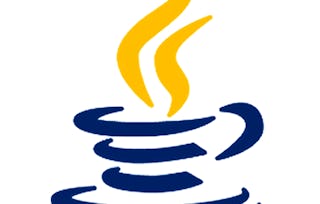Java Class Library is the fourth and final course in the Core Java Specialization. The Core Java Specialization is part of a series of programming specializations, derived from LearnQuest's private Java Bootcamps, designed to provide the skill set necessary to be hired as an IT developer using Java in many corporate environments.

Java Class Library

Java Class Library
This course is part of Core Java Specialization

Instructor: LearnQuest Network
Access provided by ITC-Infotech
22,300 already enrolled
221 reviews
Recommended experience
Skills you'll gain
Details to know

Add to your LinkedIn profile
21 assignments
See how employees at top companies are mastering in-demand skills

Build your subject-matter expertise
- Learn new concepts from industry experts
- Gain a foundational understanding of a subject or tool
- Develop job-relevant skills with hands-on projects
- Earn a shareable career certificate

There are 7 modules in this course
This module provides an overview of the Core Java - Java Class Library course. In this course, we will cover language features that enable the class library, essential library areas, and provide roadmaps to areas for self-exploration. In this module, we will learn about a major Java feature, Generics (known as template or parameterized types in some other languages), introduced in Java 5. Generics are a key tool in ensuring type safety.
What's included
2 videos3 readings1 ungraded lab
In this module, we will learn about a major Java feature, Generics (known as template or parameterized types in some other languages), introduced in Java 5. Generics are a key tool in ensuring type safety.
What's included
14 videos7 readings5 assignments2 ungraded labs
In this module, we'll talk about the Java Collection classes, which provide powerful tools for managing collections of data. Collections offer much more flexibility and functionality compared to the simple, linear arrays we've used up until now. Additionally, Java Streams (java.util.stream) introduce a new way to process data in a functional style, making it easier to work with collections in a more expressive and efficient manner.
What's included
11 videos6 readings5 assignments1 ungraded lab
Different programming models handle error conditions in different ways. Some, for example, require programmers to check error codes after every function call. Java, learning from other environments such as C++, takes a different approach known as exception handling. In this module, you will learn how Java deals with exceptions, and learn to both handle and -- when necessary -- create exceptions.
What's included
12 videos8 readings6 assignments1 ungraded lab
Java has rich Input and Output (I/O) capabilities, which have evolved constantly over the years. Java can handle network I/O, file I/O; blocking and non-blocking I/O and more. In this module we will look at an overview of I/O, and focus mostly on simple text I/O using files. We will also take a brief look at the extensive improvements made to I/O in Java 7 and Java 8, with readings to provide additional information.
What's included
7 videos8 readings2 assignments1 ungraded lab
Java Enums provide us with the ability to create a fixed set of constant values. They are objects, so they can have methods and properties, but they are a fixed, constant, set, nonetheless. The simplest ones might merely be something like the suits of a deck of cards, but we'll take a more complete look at their capabilities, and how you might use them.
What's included
3 videos4 readings1 assignment1 ungraded lab
Annotations are a way of attaching meta-data to Java code. Added in Java 5, this passive meta-data facility might not seem important at first, but is the key to how modern Java frameworks work. Spring, Spring Boot, Spring Cloud, NetFlix OSS, Java Persistence Architecture, Jakarta EE (née Java EE) containers, JAX-WS, JAX-RS, and so many others. In this module, we will look at the Java Annotations technology, look at existing annotations, and -- in the lab -- create a custom annotation, and write code to see that annotation at run-time. This means that you will not only have the ability to use annotations, but also have at least the rudiments necessary to write and process your own annotations, such you have the need.
What's included
5 videos7 readings2 assignments1 ungraded lab
Earn a career certificate
Add this credential to your LinkedIn profile, resume, or CV. Share it on social media and in your performance review.
Instructor

Offered by
Why people choose Coursera for their career

Felipe M.

Jennifer J.

Larry W.

Chaitanya A.
Learner reviews
- 5 stars
77.82%
- 4 stars
17.19%
- 3 stars
4.07%
- 2 stars
0.45%
- 1 star
0.45%
Showing 3 of 221
Reviewed on Jul 27, 2021
Excelent course, i learned a lot and i think that if you follow the lectures you get a solid base to start programming right away
Reviewed on Dec 31, 2021
I understood many of these topics already but I got much more a detailed comprehension.
Reviewed on Nov 30, 2022
This course makes you self-sufficient to continue explore Java platform on your own.
Explore more from Computer Science

LearnQuest

LearnQuest

